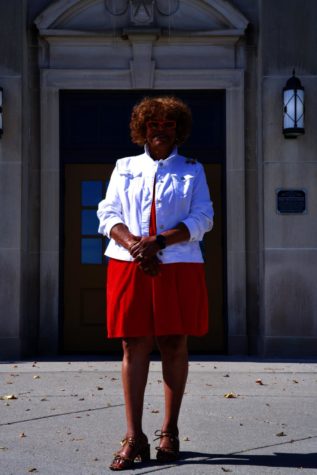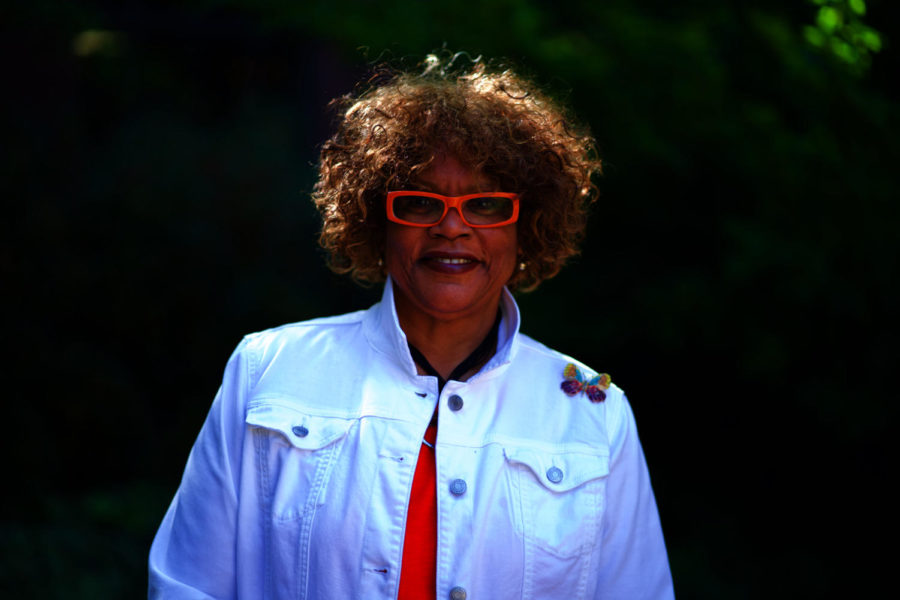Vanessa Baker-Latimer: Serving the people of Ames for 40 years
Vanessa Baker-Latimer serves as the housing coordinator for the city of Ames.
December 5, 2022
Every weekday, city of Ames Housing Coordinator Vanessa Baker-Latimer arrives at her office in the early hours of the morning to beat the surge of phone calls her office receives right as the clock hits 8 a.m. Baker-Latimer sometimes makes a call to her pastor; together they spend time with God before she dives into her work.
“She is just a really prolific woman of God in the area of working for the city of Ames and being a representative throughout every portion of her work,” said Senior Pastor Toran C. Smith of the Body of Christ Church.
When Baker-Latimer clocks in, calls range from people asking for help with landlords to moving elderly families into lower-subsidized housing. Baker-Latimer and her staff either have the answer or work to find one.
But Baker-Latimer has another title outside of housing coordinator for the city of Ames.
When Baker-Latimer calls Smith, he addresses her as “Aunt Vanessa,” which is the title the majority of her church knows her by and a way of showing respect. Smith said the reason behind this is twofold: within the American of African Descent culture, it is a sign of honor, and within her faith, her title represents spirituality.
“She often states about having a heart to serve and tries to gain other people to have a heart to serve, like Christ did,” Smith said.
Smith first heard of Baker-Latimer in 1988 as an undergrad attending Iowa State University. He didn’t know many people when he arrived, Smith said, but he did know Baker-Latimer as a distinguished pillar in the Ames community.
Baker-Latimer has spearheaded projects such as buying run-down properties and working with nonprofits to help rehabilitate them into low-income housing.
A long love for people
When Baker-Latimer isn’t helping the citizens of Ames directly, she is working with other city departments on housing or community development projects. Regardless of her varying daily schedule, serving the public is at the heart of Baker-Latimer’s work.
“So that’s people all day,” Baker-Latimer said. “I’m working with my staff on how can we do more. Sometimes we go out, and we volunteer. We’ve done volunteer Meals on Wheels as a team, just to get out and give back to the community.”
Kelly Diekmann, the planning and housing director for the city of Ames, said Baker-Latimer always leaves an impact on the neighborhoods she works with. Baker-Latimer is a community leader, always looking to help others, he said.
“She understands the roles of non-profits in the city to help people that are in need,” Diekmann said. “Not just for housing issues but for other parts of life and services across the city.”
Baker-Latimer’s passion for helping people comes from her parents, whom she said were also “people-people.”
So Baker-Latimer grew up with a people-first mindset. She and her two sisters used to play games where they would pretend to aid individuals with any problem that occurred. While her sisters served as a nurse and a secretary, Baker-Latimer helped their “clients” find answers to their issues.
When Baker-Latimer came to Ames, the city had the Section 8 program to help families and the elderly with their rent. Baker-Latimer said she had the opportunity to continue this program while creating other affordable housing programs for the city.
“Vanessa has a tireless amount of energy to pour into the city of Ames,” Diekmann said. “She is just very dedicated, not just to her work but to being involved in committees and volunteer activities…She just does that constantly.”
Once hired, Baker-Latimer wanted to gauge the housing needs of the Ames community. One of her first tasks as housing coordinator was launching a city-wide housing survey.
The survey found that the citizens of Ames needed greater housing availability. Since Ames is a college town, competition for housing is usually tight for buyers. The survey found a need for basic rental units for those looking to reside full-time in Ames instead of housing suited for dormitories. Baker-Latimer also worked with the county to create a county-wide affordable housing program.
“We found that there was a niche for people who wanted to stay here but really had a gap for affordability to buy,” Baker-Latimer said.
Serving the public in lockdown
When the COVID-19 virus broke out, Baker-Latimer’s days only became busier. Her office received notification that the city of Ames would receive funding to aid citizens with the hardships of the pandemic, but the requirements and guidelines weren’t exactly clear.
“Not all regulations always fit the situation,” Baker-Latimer said. “Because most of the time, the regulations are based on a bigger population, a bigger community and not specific to the needs of the city of Ames.”
Baker-Latimer said the city had to figure out the community’s needs considering the pandemic and do so quickly because people needed help. The main areas where the city provided aid included rent, utilities and mortgages.
“We didn’t need people losing their homes because they got laid off from work or because they got COVID,” Baker-Latimer said. “It just really impacts your basic living, which is their home, whether they are renting or owning.”
But, this was only half of the city’s challenges. Baker-Latimer said her office also had to balance getting the information about the funding opportunity out to the public during a lockdown. With city hall closed and the risks of catching COVID-19 still under question, Baker-Latimer and her team had to be creative in their approach to outreach.
Sure, the applications could be found online, but Baker-Latimer realized this approach still excluded a population of people who don’t have access to the internet.
“People weren’t coming to us,” Barker-Latimer said. “So, we had to find a way to get our applications to the people.”
The city turned the Parks and Recreation Auditorium into a walk-up application booth equipped with hand sanitizer and personal protective equipment. A similar process was recreated at City Hall once it opened back up. Baker-Latimer said this allowed the employees of the city to remain safe.
“We created this window process where we make-shifted a door, but we turned it into an application window where we had a screen that people could talk to us from one side, and we’d be on the other,” Baker-Latimer said. “That’s the way we kept doing applications to try not to have any gap in our system.”
Even though Baker-Latimer always tries to work on the fastest timeline, she said the process of interpreting program regulations and guidelines takes time in order to prevent jeopardizing future funding. Baker-Latimer said she imagines that it is frustrating for recipients, but her office also works to educate people on all of the hurdles her office must pass before implementing the programs.
“She is really about community at work,” Diekmann said. “She wants to keep people aware, stay in contact with them, and… it’s not really family at work, but it’s that idea of we are all here together, so we are going to be here and support each other.”
In 2019, Baker-Latimer was awarded the Carrie Chapman Catt Public Engagement Award for her outstanding achievement in her work with public entities.
“So, with a passion to care for people, you kind of just want to do the best you can,” Baker-Latimer said. “Using your talents, skills and abilities to make things happen, that’s what’s exciting for me. Especially seeing people get in a home that they didn’t think they were going to have, or just getting people some resources that they were really frustrated about and also walking through the shoes they’ve gone through.”
Baker-Latimer said while working, she tries to encourage people to go through the process of filling out a discrimination complaint if they feel they have experienced unequal treatment.
“You need to go ahead and go through the process of filing a discrimination complaint because maybe it’s not for you, but it’s for the next person that may have to go through that.”

Addressing discrimination in her field
Baker-Latimer filed a complaint after she said she experienced discrimination while she was relocating tenants. She found an apartment for the family and called the landowner, who informed her the property was still available. When Baker-Latimer arrived to look at the property, she said the landowner told her the unit was no longer available.
At first, she was confused, Baker-Latimer said, but then she realized they wouldn’t show her the apartment because she was a Black woman. To test her theory, Baker-Latimer’s white co-worker also requested to visit the unit, and the landowner was ready to rent to her on the spot.
“I am showing people that I had to stop and do it because it wasn’t right,” Baker-Latimer said. “And it needed to be stopped or addressed.”
Baker-Latimer filed a discrimination complaint and went to trial, but the court ultimately ruled since she wasn’t renting the property herself and was representing tenants, the landlord did not discriminate against her. Regardless, Baker-Latimer said it is important that the treatment be addressed to better future tenant experiences.
“It’s those kinds of things that I think about: how can I better serve the community with the responsibility that I have to make it easier, or certainly bring things here that have not been done here before?” Baker-Latimer said. “And that’s kind of my motivation. My goal is to try to leave it better than I found it or take it to the next level.”
At the start of her work, Baker-Latimer said she wanted to be viewed as the housing coordinator who happens to be Black, but recent tensions around race in America have altered her perspective.
“I’m OK with being the Black housing coordinator because I am proud of who I am,” Baker-Latimer said. “I’m going to treat everybody the same regardless of their race, creed, color or anything like that. So, it’s been an eye-opening process over the years.”
Outside of her work, Baker-Latimer is a crafter, creating invitations and centerpieces. She loves planning events for her church or a friend’s wedding. Baker-Latimer said her husband of 40 years and college sweetheart, sister and close friends keep her humble and provide an ear for her.
But after working as a housing coordinator for 40 years, Baker-Latimer said there is always new information for her to learn, and she is not an expert on anything. This frame of thinking comes from the best advice she has received, which is to extend grace in order to receive grace.
“Not everybody was raised the same, and you can’t leave them the way you found them if they say something that was offensive or ignorant,” Baker-Latimer said. “Because if you do, then they will continue to be that way. So, you have to give people the opportunity to say things to you that may really be offensive so that you can correct them. Correct that stereotype and leave them better than where they were.”
Editor’s note: a previous version of this article reported Baker-Latimer’s and her husband met in high school. It has since been corrected to state they met in college.







